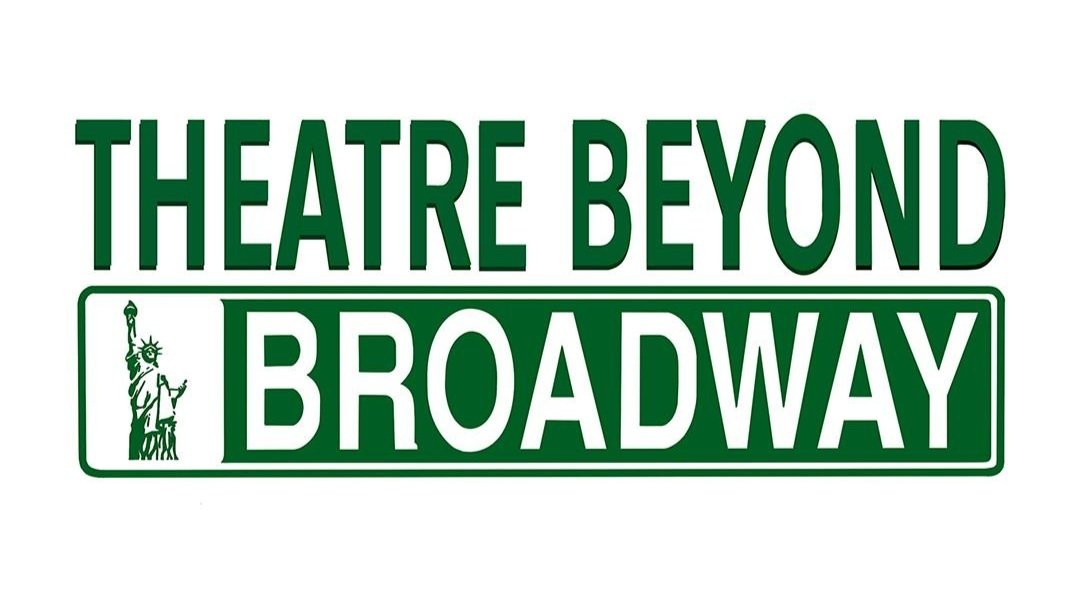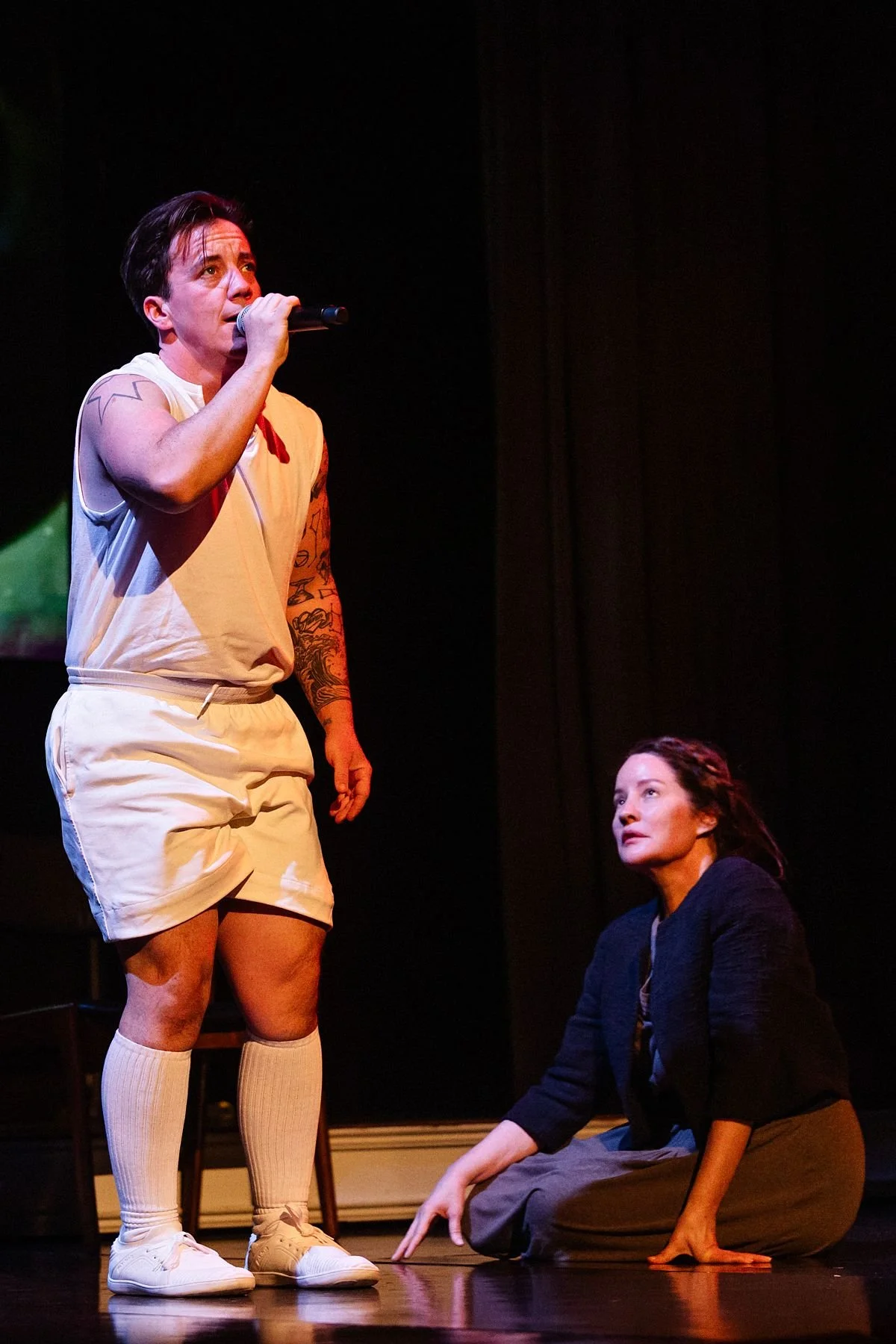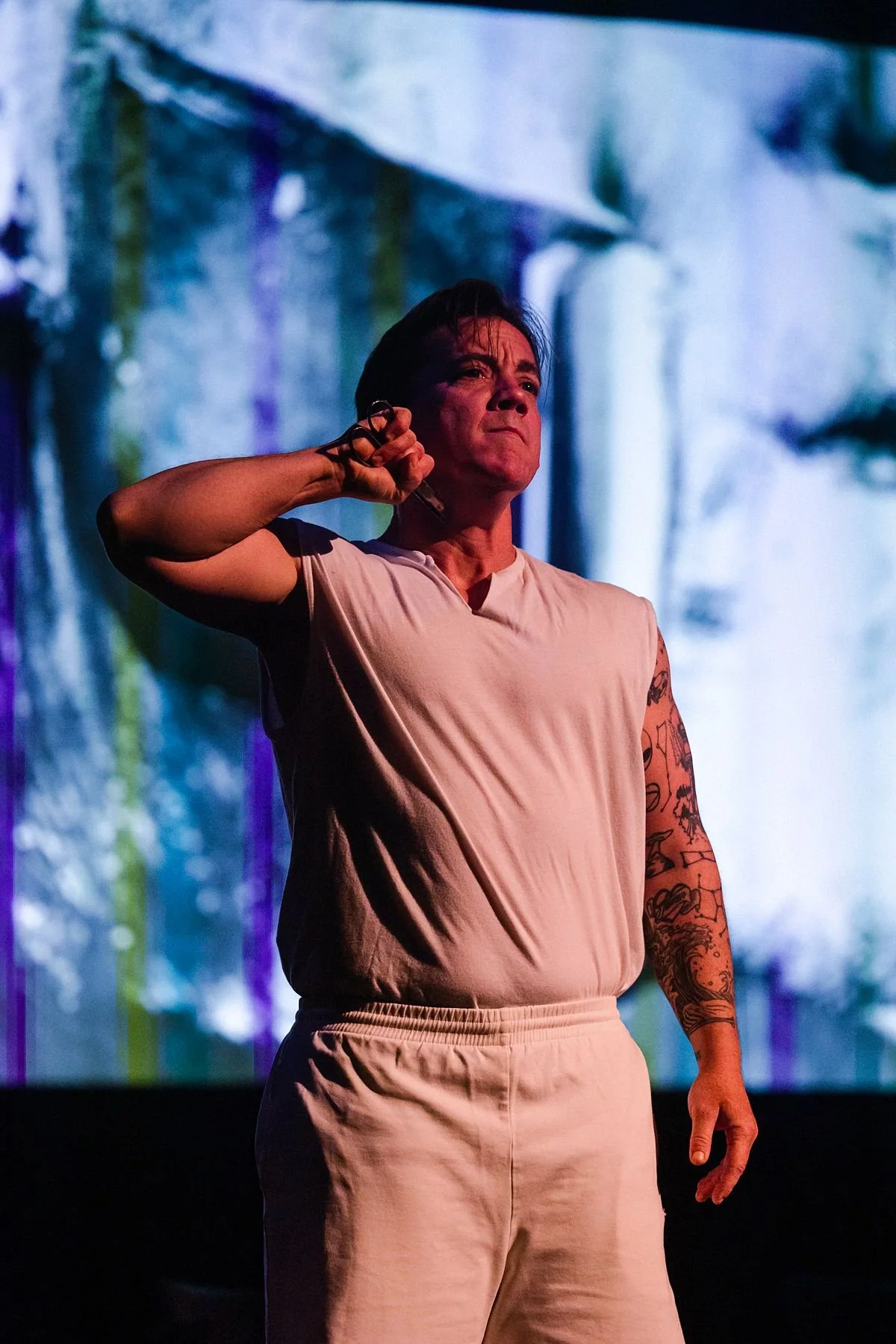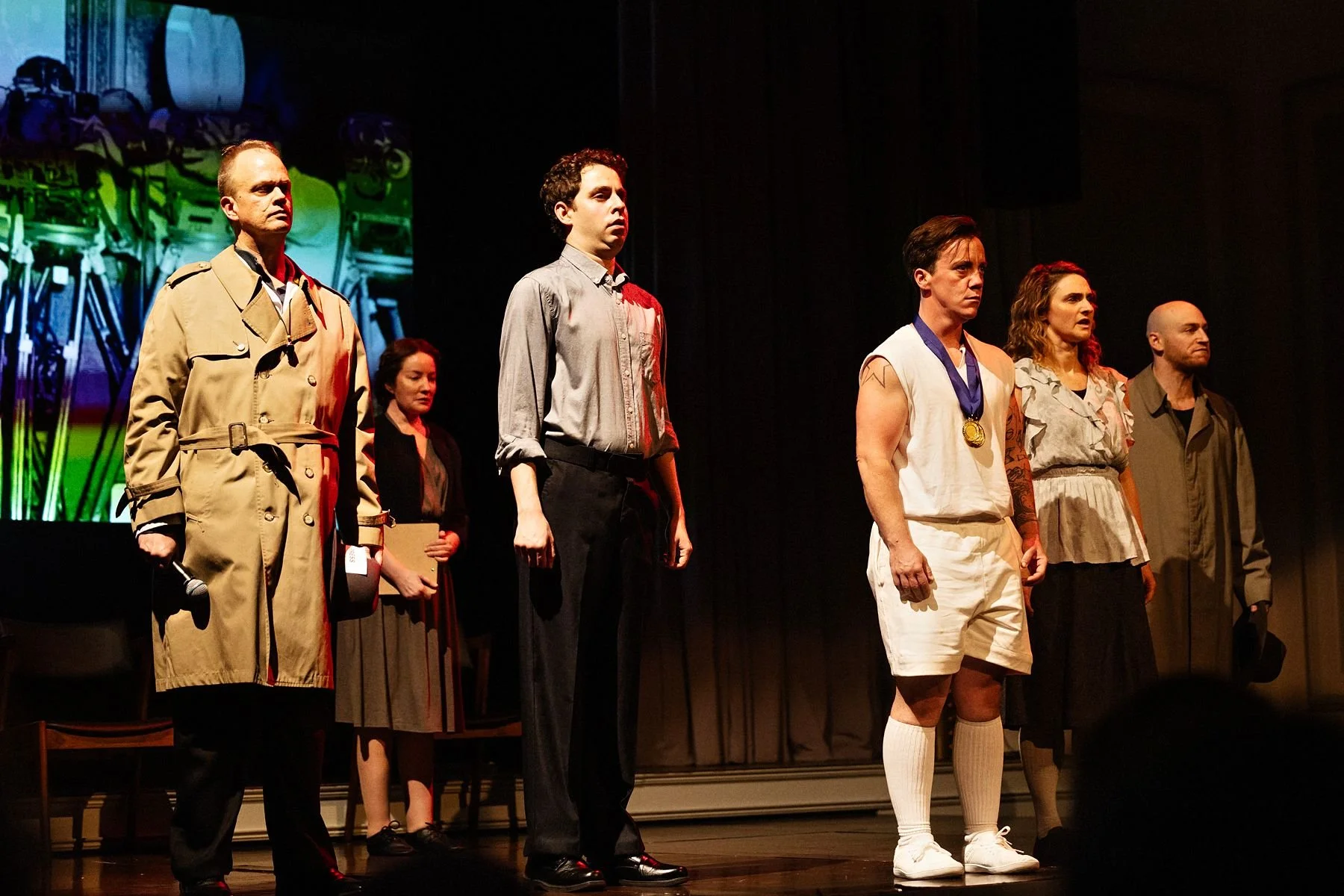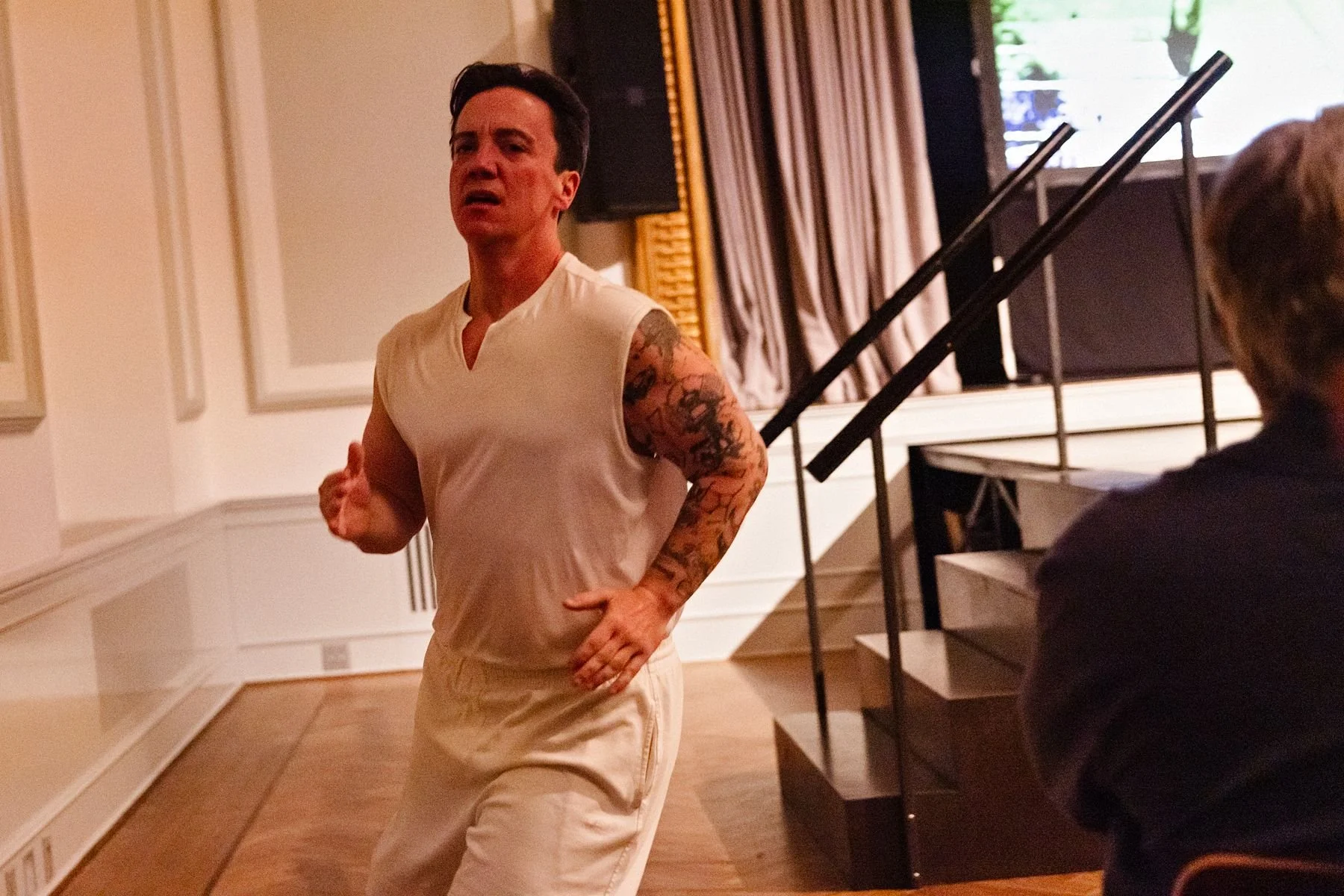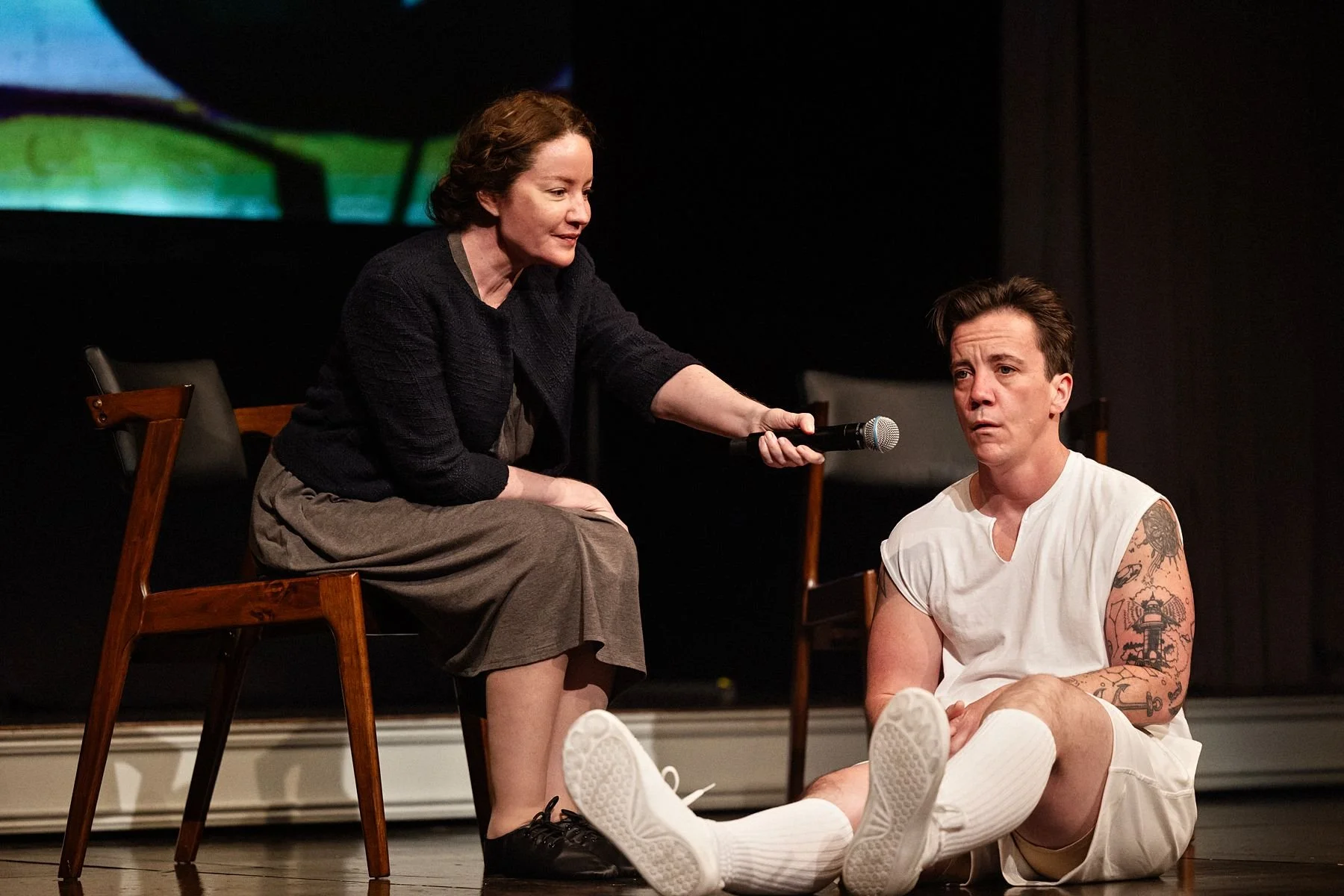BLOOD, SWEAT, AND QUEERS
Written by Tomáš Dianiška, Translated by Edward Einhorn and Katarina Vizina;
Directed by Edward Einhorn
Bohemian National Hall | 321 East 73rd Street, New York, NY
May 26 - June 15, 2025
Photos by Steve Prue
The Rehearsal for Truth International Theater Festival has returned to New York with a resilient heartbeat and a European pulse, gathering works that speak to the theme of perseverance. The Bohemian National Hall—an unassuming yet charming cultural anchor on the Upper East Side—serves as the festival’s hub. With its cozy, all-purpose atmosphere and retractable proscenium, the venue is well-suited to intimate storytelling, The festival is more than a showcase—it’s a mirror held up to Europe’s contemporary soul, refracted through translation and cultural exchange.
Among this year’s slate of contemporary European offerings, Blood, Sweat, and Queers (Transky, Body, Vteřiny) stands out as a bold centerpiece. Written by Czech playwright Tomáš Dianiška and presented by Untitled Theater Company No. 61, the play resurrects the remarkable yet nearly forgotten life of Zdeněk Koubek (1913–1986)—a celebrated athlete whose gender transition and subsequent erasure from sporting history form the backbone of this urgent narrative. Dianiška’s script pulses with punk verve and historical reckoning, offering a layered portrait of identity, fame, and societal amnesia.
Edward Einhorn’s English translation of Blood, Sweat, and Queers—co-created with Katarina Vizina, who also takes on a host of vivid supporting roles—retains the raw, electric humanity that made Tomáš Dianiška’s original a sensation in the Czech Republic, where it earned the 2019 Theatre Critics’ Award for Best Play. Directed with a clear sense of urgency by Einhorn himself, the production doesn’t so much adapt the story for English-speaking audiences as it reanimates it, threading Zdeněk Koubek’s remarkable life with unnerving contemporary resonance.
Koubek’s story begins in the shadows of early 20th-century Czechoslovakia, where he is born without medical oversight and assigned female at birth. As Zdeňka, a spirited child with prodigious athletic gifts and a tomboy’s rebellious fire, the world begins to press in. A moment of accidental performance—stepping into a male role during a chaotic amateur theater production—becomes a point of awakening. Donning a fake mustache, saving the show, and tasting the comfort of masculine embodiment, the young protagonist begins a journey not just of identity, but of reclamation.
Einhorn and Vizina’s translation navigates this inner and outer metamorphosis with clarity and compassion, never sentimentalizing Zdeněk’s experience but allowing its complexity to shine. The past may be a distant country, but here it speaks directly to the fractured, ongoing present.
As Blood, Sweat, and Queers unfolds, the life of Zdeněk Koubek resists the neat labels history—and theater—so often crave. Initially living as Zdeňka and identifying as a lesbian, the young athlete is hounded for her masculine appearance, subjected to cruel derision from a society unwilling to reconcile difference. But at age 17, after ascending to national fame as a track-and-field prodigy, a collapse from exhaustion leads to a revelatory diagnosis: Zdeňka is intersex. The anatomical nuance—interior testicles, a slight penis—becomes, in the eyes of the medical establishment and eventually the world, the justification for a radical reclassification. Zdeňka becomes Zdeněk, not through transition, but through a reluctant system’s reluctant recognition.
This moment of affirmation—quiet, clinical, and devastatingly tender—is among the most poignant in the play. It is not triumph in the conventional sense, but a release: a societal acknowledgment of what Zdeněk has long intuited. He is not “fixed,” but rather finally seen. A surgical enhancement follows—not to change who he is, but to allow the body to better match the life he’s ready to live. And with it comes the promise of romantic love and personal joy.
But joy is never far from shadow. This is not a tidy hero’s arc, nor simply a trans or intersex narrative. Dianiška’s script—anchored in fierce performances and given voice through Einhorn and Vizina’s sensitive translation—insists on ambiguity, complexity, and lived contradiction. It’s a story about identity, yes, but also about the brutal limits of social legibility, and the cost of survival in a binary world.
The final moment is a masterstroke of quiet devastation. As Zdeněk and his girlfriend imagine a future together, she dons an overcoat marked with the yellow Star of David. The year is 1934. The body may be at peace, but history, once again, is preparing to make war on difference. This isn’t just biographical theater—it’s an act of historical reclamation, a reckoning with the personal and the political, and a haunting reminder of the fragility of hard-won freedom.
Visually austere but emotionally resonant, Blood, Sweat, and Queers embraces a stripped-down aesthetic that serves the material with surprising power. This is poor man’s theater done right—minimal in resources, maximal in effect. Chris Carcione’s subtle video projections and period photography paired with Becca Silver’s nuanced sound design inject moments of atmospheric heft, while Ramona Ponce’s costumes deftly support the ensemble’s rapid-fire transformations. With characters multiplying and shifting across time and context, the cast—Katarina Vizina, Craig Anderson, Herschel Blatt, Ethan Fox, Jean Marie Stodolski, and Alyssa Simon—moves with clarity and conviction, never losing the emotional throughline.
At the center of it all is Hennessy Winkler as Zdeněk Koubek, delivering a performance that is physically fearless and emotionally raw. A trans man himself, Winkler brings an undeniable authenticity to the role—confirmed during a post-show talkback that only deepened the resonance of his portrayal. Whether sprinting laps around the audience or enduring punishing physical drills onstage, he captures with startling precision the friction between the body as seen and the self as known. His Zdeněk is not an idea or symbol, but a fully lived presence: proud, bruised, and deeply human.
One minor quibble—Winkler’s heavily tattooed arms, while a personal expression, occasionally disrupt the historical illusion. In a role that hinges so profoundly on physical transformation and societal perception, the visual reminder of a modern sensibility can be momentarily jarring. Still, this is a small distraction in an otherwise compelling and deeply affecting performance.
Ultimately, the production’s modest means prove a virtue. In a world of spectacle, Blood, Sweat, and Queers relies on something rarer: honesty, urgency, and a cast fully committed to telling a story that history tried to forget.
Tomáš Dianiška’s Blood, Sweat, and Queers does not flinch. It looks fascism in the eye—not just the historical kind, but the kind that creeps in quietly, masked by civility, gender norms, and bureaucratic language. The play entwines Zdeněk Koubek’s personal odyssey with the broader, brutal machinery of homophobia, transphobia, and gender policing that surged in the shadow of authoritarianism. The resonance with today’s political climate is chilling. As we watch the characters try to carry on with hope, dignity, or simply normalcy, we’re left with a harrowing question: are we, too, naïvely convinced that things can’t possibly get worse?
Yet this is no mere cautionary tale. Blood, Sweat, and Queers transcends the biographical format to become something more urgent—a defiant act of remembrance and resistance. Zdeněk Koubek’s story, nearly lost to time, is not just retold here; it’s reclaimed as a rallying cry. In a moment when bodily autonomy, gender identity, and lived truth are again under siege, this play feels less like a piece than a dispatch from the frontlines. Dianiška’s work is both an elegy and an indictment, a warning and a celebration. It asks not just that we bear witness to Zdeněk’s extraordinary life, but that we recognize its echoes in the world around us. Some stories demand to be told. This one demands to be remembered.
Click HERE for tickets.
Review by Tony Marinelli.
Published by Theatre Beyond Broadway on May 28th, 2025. All rights reserved.
